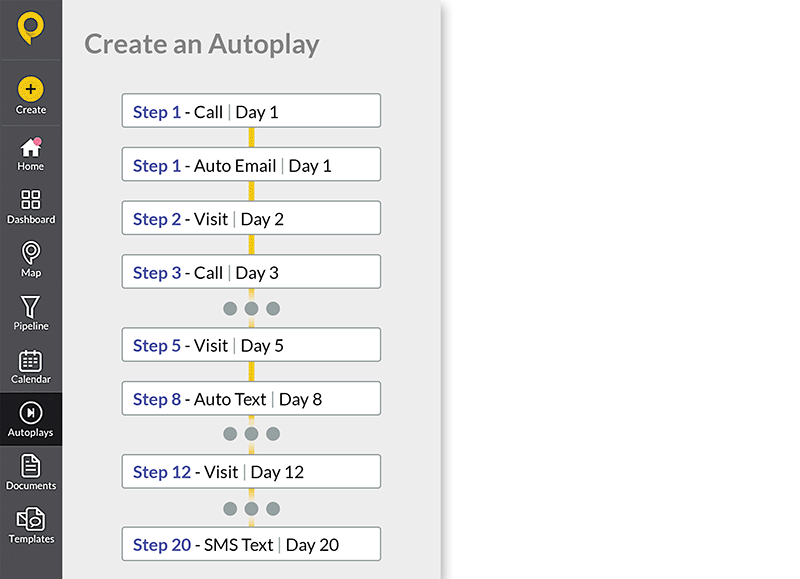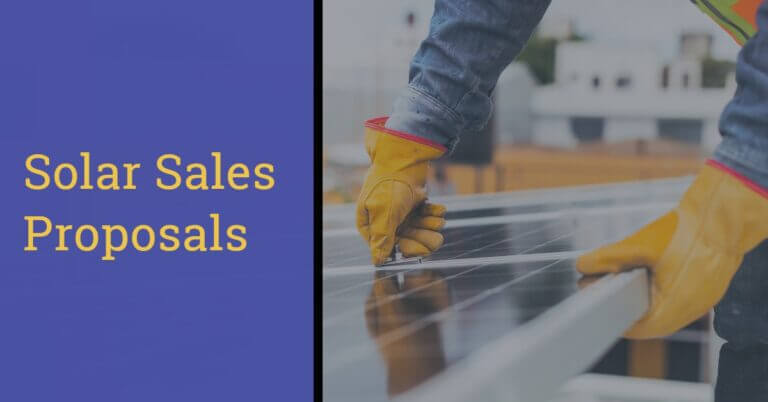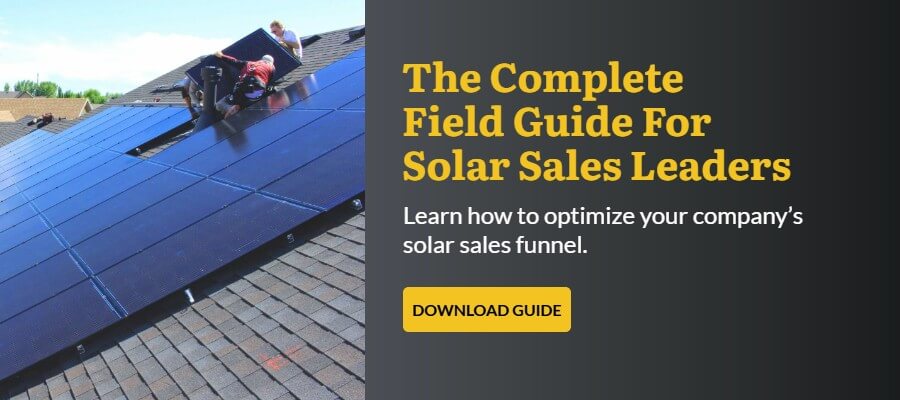The solar industry represents vast opportunities.
But if you’re in solar sales, you know that it’s not all sunshine and rainbows. The field is highly competitive, and more often than not, multiple solar installers bid on every job.
How can you succeed in this kind of environment? Should you even try, or should you take your ball and go home? We can’t answer the second question for you. But we can assure you that, yes, success is possible. You just need to develop and implement a solid solar sales strategy.
When you do, pay special attention to your solar proposal, as this seemingly simple document can help differentiate your company from the competition and lead to additional revenue.
In this article, we’ll explain what your solar proposals should include and how to boost your odds of closing a solar sale. We have a lot of valuable information to share, so let’s dive in!
What To Include In Your Solar Proposal
First things first, what should your solar proposal contain? While every proposal you send will be different, they should all include the 10 essential elements below.
Your Company Overview
Make sure your solar proposals include a company overview section. In it, tell potential customers about your solar company. Share info about how long you’ve been in business, accolades you’ve received, and why customers should buy from you instead of a competitor. You can also add details about previous solar projects you’ve completed to help build trust.
Results Of The Site Survey And Engineering Analysis
Before you send a solar proposal, conduct a site survey, and have your engineering team analyze the specific residence in question. Then include details from these two activities in the official proposal you send to potential customers. Said details should include the condition of the roof, shaded areas, the energy consumed each year, and how to connect the PV system.
Project Details And Scope
Next, use your solar proposal to share specific project details with your potential customer, and what the scope of the project will look like. A few ideas include:
- The size of the proposed solar system
- The suggested location of the solar system
- The components needed to make the system work
- The materials necessary to make the system a reality
- The schedule you and your team will follow to build the system
- The payment terms your potential customer must agree to
Projected ROI
Solar systems are expensive. The most reliable way to close deals in this industry is to remind potential customers of the money your system will save them. In other words, stress the ROI.
Can you slash your prospect’s energy bill by 75% or 80%? If so, how much will they have to pay for electricity after your system is installed? Will your system add value to their home? If so, what’s your estimate? And how long will it take them to recoup their investment? Include as many of these details as you can in your solar proposals to help increase conversion rates.
Potential Rebates And Incentives
Since we’re on the topic of money, add rebate and incentives information to your solar proposals, too. How much will these programs save potential customers—both now and in the future? These details are often confusing, so simplifying them will be much appreciated.
Financing Options
Wait, we’re not done with the financial side of your proposal! Remember, solar panels are expensive, which means very few customers are able to pay for them outright. That’s why your proposals need to include financing information. Tell potential customers about their options, including solar loans, solar leases, and power purchase agreements (PPA).
Note: If at all possible, line up specific financing partners for prospects before you send them a solar proposal. That way they have precise data with which to make a purchase decision.
Provide Social Proof
To make sales—in any industry, not just solar—you need to earn your prospect’s trust. One of the best ways to do this is to lean into the idea of social proof. This includes things like:
- Online reviews
- Video testimonials
- Recent case studies
- Awards you’ve received
- Number of installs completed
If you’ve worked with a prospect’s neighbor, include this information in your proposal, too. Social proof is extra powerful when it hits close to home. In this case, we mean that literally.
Licensing Information
Another way to earn a potential customer’s trust, and thus their business, is to promote the professionalism of your install team. Share licensing details in your solar proposal and pictures from completed jobs. That way prospects know they’re investment is in good hands.
Warranties And Ratings Reports
Next, give potential customers details about the equipment you plan to install on their roofs. This includes spec sheets, rating reports, and manufacturer warranty information. Doing so will help build trust, which is critical to successful solar sales, as we’ve already described.
Terms & Conditions
Last but not least, make sure your solar proposals include a terms and conditions section. That way your business and employees are protected from legal shenanigans in the future.
One more thing, quality solar proposal tools will make it much easier for you to add each of these elements to your proposals. Consider investing in one as soon as possible.
Improve Your Odds Of Closing A Solar Sale
A great solar proposal will help you make more sales. But to really boost your conversion rate and drive more revenue for your company, keep these five best practices in mind.
Be Honest
Always tell prospects the truth—even when you think it will hurt your chances of a deal.
For example, make sure potential customers know that they probably won’t be able to rely on solar for all of their energy needs, as solar panels only work when the sun is shining.
While this approach to sales might cost you in the short term, it will definitely benefit you in the long-term, and enable you to build a stronger company with a stellar reputation.
Prepare For Common Objections
Potential customers and objections go together like surfboards and waves—even if you create amazing solar proposals. To close more deals, prepare for the most common ones, like:
“It’s too expensive.”
Explain to prospects that solar is the cheapest form of every available. Then run the numbers to show them how much money they’ll save on their energy bill every month.
“I don’t want to damage my roof.”
Reassure prospects that your installers are highly professional and damage is unlikely. Also, remind them that their system, and the roof it’s installed on, can be protected by warranties.
“I’m planning to move.”
Tell prospects that solar can benefit them, even if they don’t plan to stay in their houses much longer. For one thing, homes with solar sell faster and for more money than those without.
“I’m not sure if this is the best investment.”
Encourage prospects to invest in multiple things, including solar. Why? Because solar is a stable investment that will save them money on energy and increase the value of their home.
Know Your Product
Prospects won’t buy from you if you don’t know your product like the back of your hand.
You should be able to answer every question they ask of you in a clear and concise way. Doing so will not only give prospects the information they need, but build trust.
Potential customers will think, “Wow, this person really knows their stuff. I feel comfortable working with them. I’m ready to pull the trigger and purchase solar panels for my home.”
Provide The Opportunity To Ask Questions
You sell solar panels, which means you regularly ask your prospects to make big, potentially life-changing decisions. It’s only fair that you give them a chance to ask questions.
Help prospective customers make the right decision for them (not necessarily for you) by answering every query that comes your way with complete honesty. Once again, this might not help you in the now, but it will definitely help you down the road.
Follow Up
Finally, allow prospects to think about their investment in solar. Is this really the best thing for them? If so, is it the right time? Let your leads decide these things for themselves.
Just don’t give them too much time or they might forget about your company and purchase solar panels from a competitor. Instead, follow up after a suitable amount of time has passed.
Tools like SPOTIO will help you automate your follow up routine. That way you don’t forget to send messages and can stay top of mind with prospects, resulting in more sales.

Sell More With SPOTIO
To succeed in this industry, you need to create fantastic solar proposals that include the 10 elements outlined above. Doing so will lead to more deals and revenue for your company.
But you also need to generate quality leads, plan efficient routes between prospects, communicate with potential customers on a consistent basis, and create detailed reports. And you need to do all of these things before you even think about your proposals.
SPOTIO can help. Our platform was specifically designed for field sales teams. As such, it has all of the features you and/or your sales team need to make sales at a consistent clip.
Sign up for a free demo of SPOTIO to learn more about how we help field sellers succeed!



